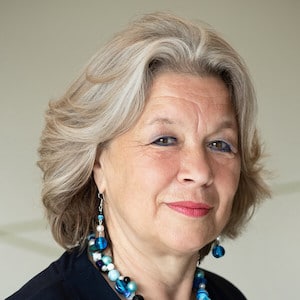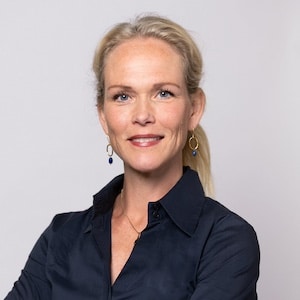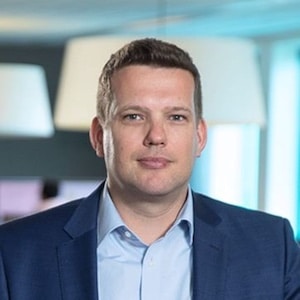Jopie Nooren: ‘Join forces and build on what has been set in motion’
"Things have to be different, the facts are undeniable," said Jopie Nooren, president of the Board of Governors of the Amsterdam University of Applied Sciences and a member of our Board. The Metropolis of Tomorrow requires bold choices and breakthroughs. What is her take on this?
“Our economic development is currently being held back. We don’t have more people, neither more money. Also: more isn’t always better. If we want to work together on inclusive prosperity, new approaches and tools are needed. Everyone needs to make an effort,” Nooren said during a discussion on Choosing for what is needed for the Metropolis of Tomorrow. Working on this call marked the start of the movement Look differently, act differently.
Jopie Nooren endorses the ideas of Look differently, act differently. She is convinced of the need to realise a new future for the Amsterdam Metropolitan Area, in which it is pleasant for everyone to live and work. At the same time, she says, “we as the Amsterdam Economic Board cannot dictate our priorities to all organisations in the metropolis. However, we should challenge organisations to embrace those priorities. This is something we need to discuss with each other. Having Formula 1 races at Circuit Zandvoort does not contribute to improving the balance between people and nature, but the judge has ruled in favour. So the challenge for a license-granting municipality is to discuss with the organiser about their contribution to the climate challenge. The trick is not to discourage organisations, but to stand alongside companies with all their knowledge and insights and to realise new, sustainable solutions. And carefully put our money where our mouth is.”

Jopie Nooren
What is the AUAS already doing?
“As the Amsterdam University of Applied Sciences, we recognise the principles of the call. Our institutional plan, entitled the University of Applied Sciences in 3D, stands for sustainability, responsible digitalisation and diversity and inclusion. We make sustainable choices, but cannot always afford to be principled. For example, as a college, we prefer not to depend on large technology companies, but sometimes good alternatives are not yet available. For example, because privacy cannot be guaranteed.”
“We are an organisation in transition. Take sustainable banking, for example: ASN and Triodos are known as the most sustainable banks, but for them colleges and universities are still too complex and large to have as clients. However, we can send a signal to the market by including other banks’ contribution to sustainability and an inclusive society in the tender. We already noticed that banks find this relevant and are developing further on these points. This is how we contribute to innovation from within.”
“Sustainability is a theme in all of our courses. For example, healthcare education is focused on the reduction of waste in materials and digital services. Economic studies focus on the concept of inclusive prosperity. That said, we still school people for the aviation industry. I believe in renewal from within. In this sector, our students and researchers can help organisations take the right steps. For example, our students are researching the potential of hydrogen as a fuel for airplanes.”
What do you think about the ninth principle: We need to make it easier to learn from each other and collaborate on innovations?
“This is a good starting point. But above all, let us build on existing initiatives and on the knowledge and insights that already exist. Sixty professors work with research groups in our Centers of Expertise on practical research focused on the social issues of the Metropolis Amsterdam, such as exercise programmes for children. We have thousands of students who can and want to do research. We can harness that talent together: the young people we train are the change agents of the future. These have tremendous thinking and executive power, are creative and agile. We need to make better use of that together.”
Are we innovative enough as a region?
“We are super innovative and there are fantastic new technologies and solutions. Because of those technologies, work is changing and companies need different kinds of qualities. We don’t have more people, so we need to work differently. We can use our innovation power for that too.”
“The Growth Fund application the National LLO Catalyst (a project of secondary schools, colleges and universities to boost lifelong development, ed.) gives education the space to explore with companies in the field of energy and resource transitions how we can design work processes smarter. Sometimes people have to retrain or learn additional skills. The challenge is also to provide opportunities for people who are currently on the sidelines. We just completed a wonderful project in which we demonstrated that people on welfare who receive intensive counseling are more likely to be gainfully employed if they are allowed to keep some of the money on top of their benefits. So we then have to make sure that it is more interesting to go to work.”
“I doubt that it is necessary to always do something new. I think we should also focus on sustainable implementation. AUAS lecturer Roeland van Geuns, now succeeded by Anna Custers, has looked at the success of anti-poverty interventions in several municipalities with his research group: From Debt to Opportunity. His main encouragement: don’t invent new interventions, but implement more broadly what is already working. Try to fund social initiatives sustainably instead of doing a one-time pilot. I think the same is true for a lot of initiatives. Not reinventing the wheel every time, but making sustainable what works.”
Citizen participation is also explicitly reflected in the principles. What do you think about that?
“Citizen collectives around energy often serve as a ‘good example’ in this regard. You can’t oppose this, of course, but these kinds of initiatives often come from people who already have a say in our region. People who already have influence and know how to get something right. But we need to encourage and organise that participation much more broadly. To achieve actual inclusive prosperity, we would include people from diverse backgrounds in those initiatives, and from all areas of the metropolis. To reach those groups, cooperation with civil society organisations is essential. Partly for this reason, I think it is good that we are going to involve them more strongly”
How are we really going to change anything?
“The call is about why and somewhat less about how. The how is complicated. Within the Board, we see the same thing: some organisations move faster and some move slower. For the how, we need to show concrete, successful examples. To show there is something to be gained. Techport in the IJmond region is one such example: a public-private partnership for the manufacturing and maintenance industry that is really changing things. Those collaborations can have a big impact on our challenges. They help make the most of the powerful organisations and powerful talents in the region.”
Read more interviews with partners on Look differently, act differently.
7 July 2023
Read more about
Contact us
Want to keep up to date?
Get the best regional news and events (in Dutch) via the Board Update newsletter
Share this news
Want to keep informed?
Follow us daily on LinkedIn and sign up for the Board Update newsletter.
Read more
- Preparations for the National Zorginnovatieprijs 2026 by Zorginnovatie.nl are underway, and registration ...
- As CEO of Ballast Nedam Development, Onno Dwars believes in impactful building. ...



